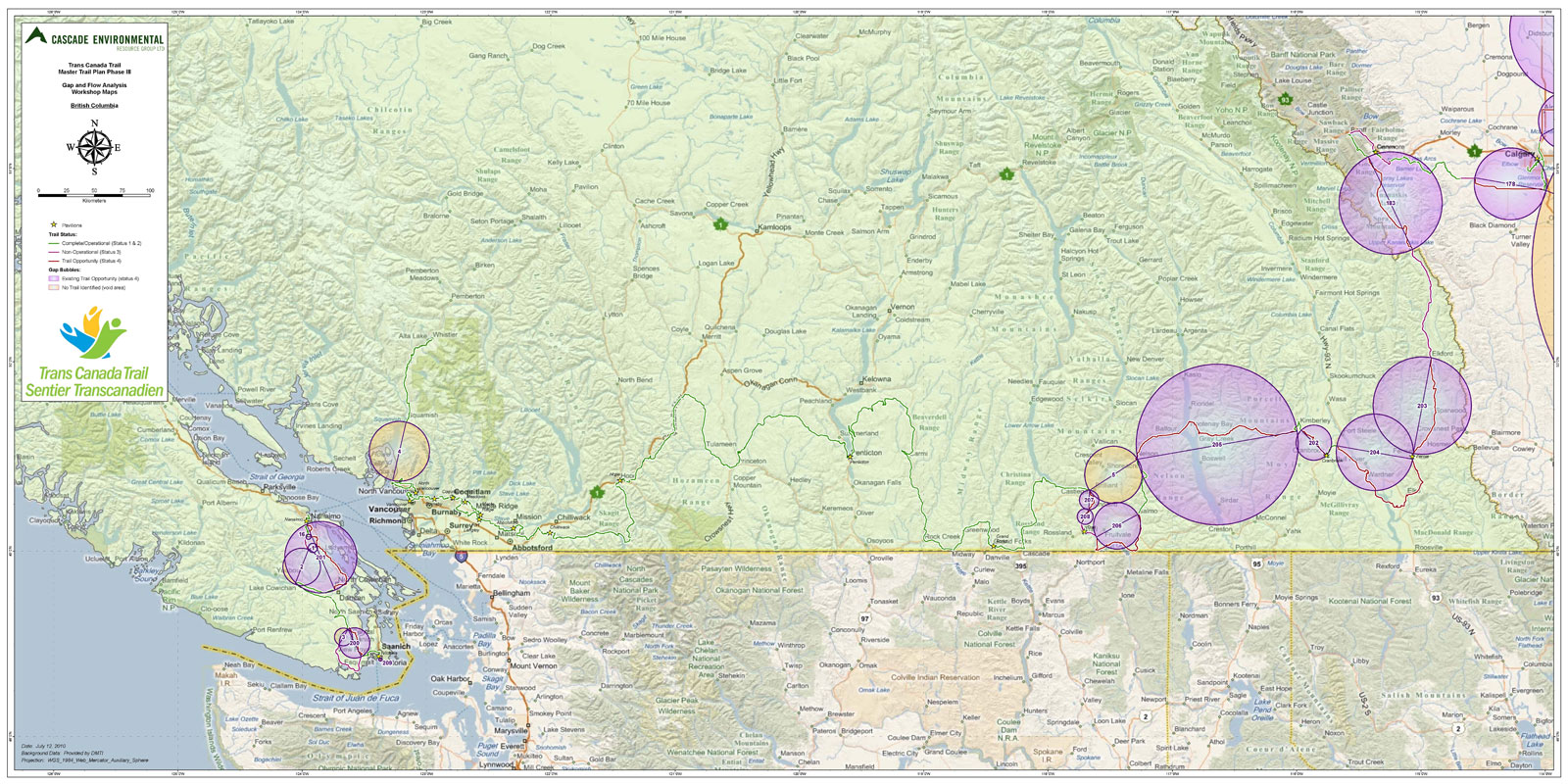Overview:
Cascade was retained to provide policy advice to the Trans Canada Trail Foundation on how to manage ATV use on the Trail, to develop a Master Plan for further development of the trail and Strategic Environmental Assessment.
Details:
Project Type: Recreation Management & Master Plan
Location: Canada
Client: Trans Canada Trail Foundation
Contract Period: 2009-2010
Total Contracts Value: $295,800
Policy Analysis – ATV use on the Trans Canada Trail ($3,000)
Cascade was retained to provide policy advice to the Trans Canada Trail Foundation on how to manage ATV use on the Trail. Two policy options were developed in consultation with the TCT, which were discussed by the TCT Board of Directors and became the Greenways: Vision and Values document which restated the TCT’s desire for the Trail to be non-motorised.
White Paper – Completing the Trans Canada Trail: An analysis of the issues ($16,000)
Cascade was retained to carry out an analysis on the issues the TCT faces in further developing the Trail. The White Paper looked at:
- how the TCT in its current form came about
- what the current state of the TCT is, and the organisational context under which it has developed
- how the remainder of the TCT can be delivered in the context of the vision and values
Refresh of the Trans Canada Trail Trailbuilder’s Policy ($49,800)
Refreshing the Trailbuilders Policy will allow the principles behind the recent Greenways Policy to be properly integrated into further trail development, and provide a mechanism for identifying and protecting segments of trail that are of higher value. It is proposed that the term “policy” be dropped, and the new document be developed as the “Trailbuilding Guidelines”.
The approach taken to writing the Trailbuilding Guidelines will be one of close collaboration with TCT operational staff, and with the TPAC committee members. Consultation on drafts will also be carried out with TCT regional and local partners if the TCT identify suitable partners.
The chapter headings will broadly follow those of the existing Trailbuilders Policy, however these will be re-written from the ground up to meet the needs of the TCT in further trail development. The forms (such as the trail registration and signage) will be redesigned to ensure all relevant information is collected in a manner which suits the development of the Master Plan.
New sections will be included that outline best practice trail design, building and operations, including any measures that may be required as part of the Strategic Environmental Assessment
The Trans Canada Trail Master Plan ($185,000)
Cascade has been retained by the Trans Canada Trail Foundation to develop a Master Plan for further development of the trail. This Master Plan will include a detailed inventory of existing trail, gaps, destination trails, and segments of trail that require additional development. It will also develop linkages with other connector trails to ensure greater value to local communities. This work is being carried out in close consultation with TCT’s 500 local trail building / trail managing organisations.
The Master Plan is an overarching document that provides guidance to the Board of Directors and the operational staff for the delivery of the TCT based on an articulated set of goals and objectives. The Master Plan describes the TCT as it currently exists and defines what the TCT aspires to become in the future. The Master Plan is essentially the delivery mechanism for the TCT Strategic Plan to complete the gaps and improving existing segments. It will also create
Strategic Environmental Assessment ($42,000)
The SEA for the TCT encompasses both formal SEA methodologies as conducted at the federal level, as well as an existing domain of work by EA Practitioners using broader approaches for large scale projects such as the methodologies utilised under the International Association for Impact Assessment. Cascade will also draw on its extensive experience in trail design, management and maintenance to guide SEA development.
The SEA will be conducted to inform the TCT on potential environmental matters relating to further development of the Trail. The SEA will address the following components:
- scope and nature of potential environmental effects, including cumulative impacts
- mitigation measures or opportunities for enhancement
- scope and nature of residual effects after taking mitigative measures
- follow-up measures to monitor environmental effects of the Trail
- public and stakeholder concerns about the environmental impact among those most likely to be effected, and among other stakeholders and members of the public
A key component of the SEA will be identification of measures to be taken to mitigate any negative environmental effects and enhance positive environmental effects for further Trail development. These will be integrated into the Trailbuilder’s Guidelines and be used to guide development of the Master Plan.
This assessment will be carried out at a strategic national level, not at an individual Trail segment level – assessments at an individual segment level are the responsibility of groups proposing that trail. Conclusions will be drawn on matters such as: assumptions on different Trail types; broad interpretations of the habitat / environment types the Trail affects by either passing through or connecting to; and trail use and maintenance.




